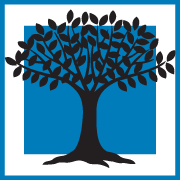Growing Thinkers, Explorers, and Leaders
Elementary School at The College School is a time of growth and increasing independence. From First through Fifth Grades, students engage in a dynamic, hands-on curriculum that blends academic challenge with creativity, collaboration, and purpose. Guided by expert educators and inspired by real-world connections, students deepen their skills in literacy, math, science, and social studies while also learning to think critically, solve problems, and contribute to their community. With outdoor adventures, thematic projects, and specialist classes woven into every year, our students grow into confident learners who are curious about the world and ready to make an impact.
Core Academic Highlights in Elementary School
Click on any of the grade levels below to see an overview of core academics.
Math
• Strengthen number sense and working with numbers up to 120
• Master addition and subtraction within 20
• Learn strategies for solving word problems
• Explore concepts of time and measurement
• Investigate shapes and their attributes
Language Arts
• Build fluency and comprehension through engaging texts
• Expand vocabulary and practice spelling patterns
• Write longer sentences and simple paragraphs
• Practice proper grammar, punctuation, and capitalization
Science
• Observe patterns in weather and temperature
• Study plant and animal life cycles and habitats
• Learn about pushes, pulls, and how things move
• Explore sustainability and conservation
Weekly Visits with Specialists
• Drama
• Music
• Art
• Greenhouse and Gardens
• Physical Education
• Spanish
Math
• Build fluency in addition and subtraction within 100 and explore multiplication and division concepts
• Practice using money, telling time, measuring length and weight, and representing data with charts and graphs
• Investigate two- and three-dimensional shapes and understand their properties
Language Arts
• Strengthen reading fluency and comprehension through a variety of texts
• Expand vocabulary and master more complex spelling patterns
• Write well-structured paragraphs and experiment with narrative, informative, and opinion writing
• Develop editing skills focusing on grammar, punctuation, and capitalization
Science
• Study the life cycles of plants and animals and how they depend on their environments
• Explore Earth’s landforms, bodies of water, and natural processes like erosion and weathering
• Develop skills in asking questions, making observations, and conducting simple investigations
Weekly Visits with Specialists
• Drama
• Music
• Art
• Greenhouse and Gardens
• Physical Education
• Spanish
Math
• Master addition and subtraction within 1,000
• Learn multiplication and division within 100
• Understand fractions as numbers and comparing fractional values
• Investigate concepts of area, perimeter, and geometric measurement
Language Arts
• Grow comprehension, research, and summarizing skills through fiction and nonfiction reading and writing
• Write multi-paragraph compositions, including narrative, opinion, and informative pieces
• Strengthen grammar, punctuation, and spelling conventions
• Explore creative writing through storytelling and poetry
Science
• Learn how plants and animals have inherited traits that help them survive in their environments
• Study forces and motion, including how pushes and pulls affect the movement of objects
• Practice scientific inquiry by asking questions, predicting outcomes, conducting investigations, and sharing results
Weekly Visits with Specialists
• Drama
• Music
• Art
• Greenhouse and Gardens
• Physical Education
• Spanish
Math
• Develop fluency with multi-digit addition, subtraction, multiplication, and division
• Explore equivalent fractions and operations with fractions
• Learn decimals and understand their connection to fractions
• Analyze geometric properties of angles, lines, and shapes
Language Arts
• Build comprehension skills with a focus on theme, point of view, and text structure
• Research and presenting findings through writing and projects
• Write structured essays, including opinion, narrative, and explanatory pieces
Science
• Develop knowledge about the solar system, including the sun, moon, Earth, and their relationships.
• Study Earth’s processes such as weather, the water cycle, and erosion
• Examine how forces like gravity, friction, and magnetism affect motion and simple machines.
Weekly Visits with Specialists
• Drama
• Music
• Art
• Greenhouse and Gardens
• Physical Education
• Spanish
Math
• Master operations with multi-digit numbers, including decimals
• Add, subtract, multiply, and divide fractions
• Explore volume, area, and surface area in geometric contexts
• Graph points on the coordinate plane and interpret data
Language Arts
• Analyze complex texts with a focus on themes, arguments, and perspectives
• Research and crafting multi-paragraph essays
• Write across genres, including persuasive, narrative, and informative essays
• Develop advanced grammar, sentence variety, and vocabulary skills
Science
• Study life cycles, adaptations, and the functions of major human body systems
• Understand properties of matter and how substances change through physical and chemical processes.
• Explore forces and motion and their effects on objects.
Weekly Visits with Specialists
• Drama
• Music
• Art
• Greenhouse and Gardens
• Physical Education
• Spanish
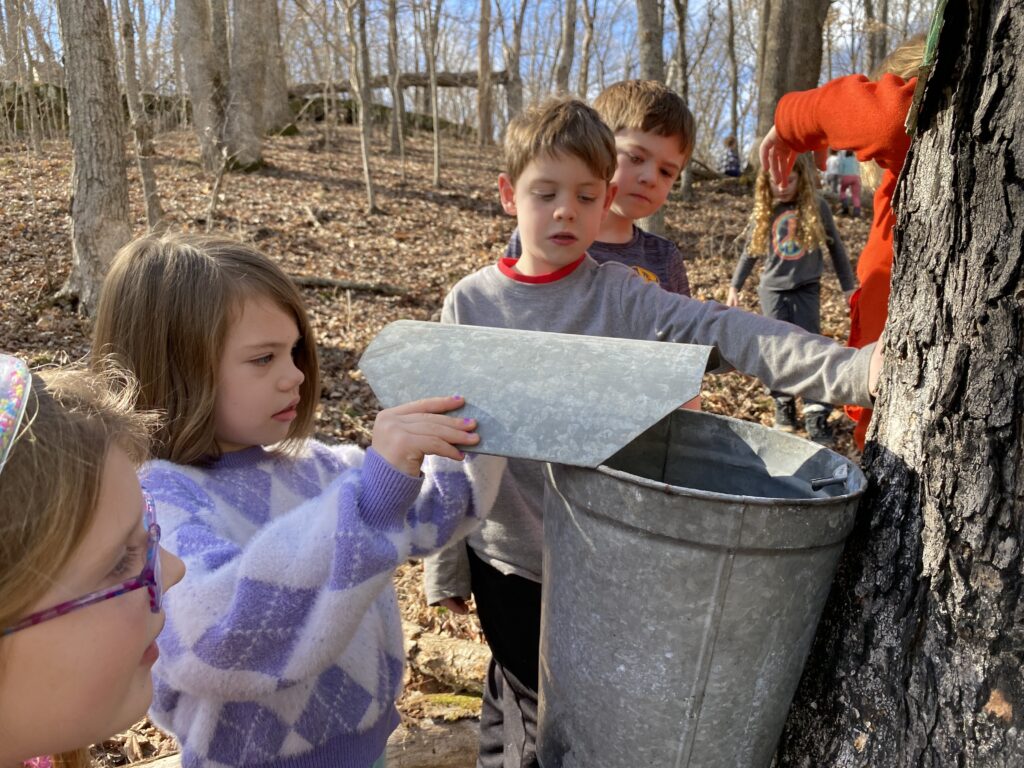
Thematic Learning in Elementary School
At TCS, we use thematic learning across our grades to make education meaningful, connected, and engaging. By weaving subjects together around rich, real-world themes, students see the relevance of what they’re learning, make deeper connections across disciplines, and build skills in critical thinking, collaboration, and creativity.
Learn more about our Elementary Grade Themes below!
First Grade
Where Does Our Food Come From? ThemeWhere Does Our Food Come From? Theme
During their yearlong “Where Does Our Food Come From?” Theme, first graders connect academic subjects through meaningful, real-world experiences that spark curiosity and deepen understanding. For example, while studying the life cycle of chickens, students care for eggs and chicks, practicing observation, responsibility, and empathy. During the maple sugaring project at our LaBarque Campus, they apply measurement, data collection, and procedural writing as they tap trees and boil sap—making connections between classroom learning and the world around them.
Second Grade
Water ThemeWater Theme
Second graders explore how living things interact within their environment. As part of the Missouri Department of Conservation’s Stream Team, students monitor the macroinvertebrate population in Sandy Creek at our LaBarque Campus. Through hands-on fieldwork, they learn how to observe and collect data, identify different species, and understand how biodiversity reflects the health of an ecosystem. Back at school, they analyze their findings and create a report to share their results—building real-world skills in scientific inquiry, critical thinking, and environmental stewardship.
Third Grade
Community ThemeCommunity Theme
As part of a year-long Community Theme, third graders seek to understand how community works. They visit neighborhoods and historic sites, conduct interviews, write stories and articles based on their experiences, complete four-page research papers, and ultimately, build a model community at our LaBarque Campus. Not only do they learn about urban planning and economic literacy, they also learn how to synthesize ideas into a concrete project.
Fourth Grade
Changemakers ThemeChangemakers Theme
Students explore the inspiring theme of Changemakers, delving into the lives and legacies of influential figures throughout history who have made a lasting impact on the world. Through engaging research and discussions, students discover the qualities that drive change and the power of individual action. Building on this knowledge, the class collaborates to design and implement their own local project, empowering them to create meaningful change in their community and become changemakers themselves.
Fifth Grade
Monarch ThemeMonarch Theme
Fifth graders engage in hands-on science by raising monarch butterflies, creating technical drawings, and analyzing data to strengthen observation and analytical skills. They deepen their learning through interviews with experts and visits to local institutions like the Zoo’s Insectarium and Butterfly House. In the field, students participate in tagging monarchs for the International Monarch Watch, gaining real-world research experience. Through reflection, they develop environmental awareness and understand the impact of human actions on conservation and migration.
Cornerstone Adventures in Elementary School
At The College School, learning extends far beyond the classroom—our students take part in more than 145 day and overnight trips each year. These journeys are not just field trips; they’re deeply connected to the curriculum and designed to bring learning to life. As students progress from grade to grade, these Cornerstone Adventures evolve—growing in length, complexity, and purpose. What begins as a first overnight campout in early grades becomes a multi-day expedition in later years, offering students increasing opportunities for challenge, independence, and personal growth.
See below for an example Adventure from our Elementary grades.
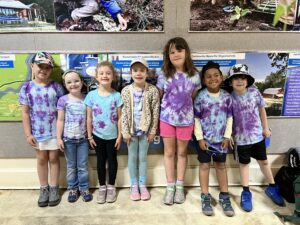
In First Grade, students take part in their first overnight trip at TCS, an important milestone that fosters independence, confidence, and a deepened connection to the natural world. Held at our LaBarque Campus, this overnight adventure includes bird observation, creek exploration, and introductory rock climbing. More than just outdoor fun, the experience invites students to practice perseverance, support one another, and step outside their comfort zones. The pride they feel upon returning to campus is lasting, and the trip lays the foundation for future expeditions, helping students see themselves as capable, curious learners ready for new challenges.
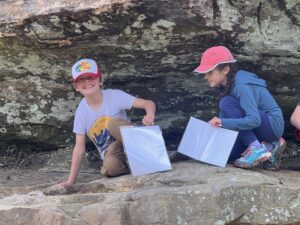
Students take on an even bigger adventure in Second Grade with their first tent camping overnight—an exciting milestone that builds on their growing confidence and love of the outdoors. At our LaBarque Campus, they pitch tents and spend extended time exploring the natural world through activities like creek studies, hikes, and wildlife observation. This experience challenges students to persevere through new situations, lean on each other for support, and push past their comfort zones in a safe, encouraging environment.
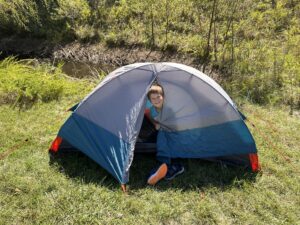
One of our favorite student reflections is, “On the Third Grade Campout, I learned I was brave.” The fall campout is a highlight of Third Grade and connects directly to their Community Theme, giving students the chance to discover their place within both their class community and the world. Through our Adventure Education program, students are encouraged to challenge themselves and safely take healthy risks. This experience helps them realize they’re capable of more than they ever imagined—one of the most powerful lessons they can carry forward in their learning journey.

The fall theme for Fourth Grade, States & Stories, immerses students in U.S. geography and history starting from 1619. Through hands-on field experiences, students develop a deeper understanding of important historical figures and events. They build research, presentation, and creativity skills by exploring a specific state and sharing its unique features at the Fourth Grade “State Fair.” As a captone experience, students travel to Springfield, Illinois, for a two-day, one-night learning journey to visit the Lincoln Museum and a colonial campsite. This experience provides engaging, immersive learning that brings history to life.
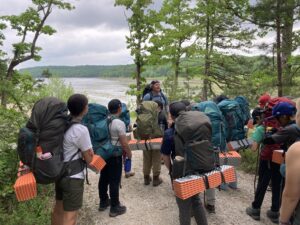
Each spring, fifth graders embark on a three-day, two-night backpacking and camping adventure in the Ozarks. Carrying their own gear and working together to set up camp and cook meals, students build resilience, teamwork, and self-reliance in a beautiful natural setting. Along the trail, they practice outdoor skills, deepen their appreciation for nature, and gain confidence that prepares them for new challenges ahead, including the five-day, four-night Wilderness Experience in Sixth Grade.
Ready to join our adventures? Learn more about Admissions.

